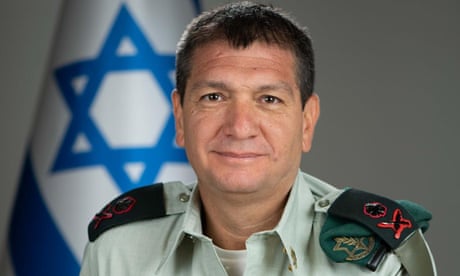
The head of Israel’s military intelligence has resigned over the failures surrounding Hamas’s unprecedented attack on 7 October, becoming the first senior figure to step down over his role in the deadliest assault in Israel’s history.
Maj Gen Aharon Haliva wrote in his resignation letter: “The intelligence directorate under my command did not live up to the task we were entrusted with.
“I have carried that black day with me ever since, day after day, night after night. I will carry the horrible pain of the war with me for ever.”
Amid continued widespread public anger with the political and intelligence lapses, Haliva called for a state commission of inquiry to investigate the failures as he announced he was stepping down.
“I am convinced … that it is appropriate to set up a state inquiry commission that can thoroughly, deeply, comprehensively and critically investigate all the factors and circumstances that led to the tragic events,” he added.
Haliva’s announcement sets the stage for what is expected to be further fallout from Israel’s top security brass over Hamas’s attack, when militants breached border defences, rampaged through Israeli communities unchallenged for hours and killed 1,200 people, mostly civilians, while taking about 250 hostages.
Previous commissions of inquiry including the Agranat commission, which examined the causes of the Yom Kippur war in 1973, and the Kahan commission into the Sabra-Shatila massacre in Lebanon in 1982 led to widespread political repercussions.
While Haliva and others have accepted blame for failing to prevent the attack, others have stopped short, most notably the prime minister, Benjamin Netanyahu, who has said he will answer tough questions about his role but has not outright acknowledged direct responsibility for allowing the attack to unfold.
He has also not indicated that he will step down, although a growing protest movement is demanding elections be held soon.
Continuing public anger in Israel over the intelligence failings was underlined in new polling by the Israel Democracy Institute that suggests more than 62% of Israelis believe those responsible for the failures of 7 October should resign, while 51% support elections by the end of this year.
Haliva had previously taken public responsibility for the failures, saying a week after the Hamas attack: “We did not live up to our mission,” adding: “I bear full responsibility for the failure.” But he said he would stay in position until the war with Hamas concluded.
Haliva had been seen as particularly vulnerable to the fallout from the October attack. He was on holiday in the Red Sea resort of Eilat and was called in the early hours of that morning to be updated about a potential Hamas attack, but had then played no role in conversations among senior Israel Defense Forces staff regarding what was happening.
The Hamas attack set off the war in Gaza, which is in its seventh month.
The Israeli military said in a statement that Haliva had asked to end his service “following his leadership responsibility’.
Shortly after the war, Haliva had publicly said that as head of the military department responsible for providing the government and the military with intelligence warnings and daily alerts, he shouldered blame for not preventing the assault.
The military said in the statement that the military chief of staff accepted Haliva’s request to resign and thanked him for his service.
Haliva, as well as other military and security leaders, were widely expected to resign in response to the glaring failures that led up to the 7 October attack.
The timing of the resignations is unclear, because Israel is still fighting Hamas in Gaza and battling the Lebanese militant group Hezbollah in the north. Tensions with Iran are also high after attacks between the two enemies.
Agencies contributed to this report